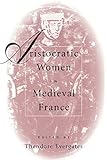Aristocratic Women in Medieval France / ed. by Theodore Evergates.
Material type: TextSeries: The Middle Ages SeriesPublisher: Philadelphia : University of Pennsylvania Press, [2010]Copyright date: ©2000Description: 1 online resource (288 p.)Content type:
TextSeries: The Middle Ages SeriesPublisher: Philadelphia : University of Pennsylvania Press, [2010]Copyright date: ©2000Description: 1 online resource (288 p.)Content type: - 9780812217001
- 9780812200614
- 305.48/9621 21
- HQ1147.F7 A75 1999eb
- online - DeGruyter
- Issued also in print.
| Item type | Current library | Call number | URL | Status | Notes | Barcode | |
|---|---|---|---|---|---|---|---|
 eBook
eBook
|
Biblioteca "Angelicum" Pont. Univ. S.Tommaso d'Aquino Nuvola online | online - DeGruyter (Browse shelf(Opens below)) | Online access | Not for loan (Accesso limitato) | Accesso per gli utenti autorizzati / Access for authorized users | (dgr)9780812200614 |
Frontmatter -- Contents -- Maps and Genealogical Tables -- Preface -- Introduction -- 1. Adela of Blois: Familial Alliances and Female Lordship -- 2. Aristocratic Women in the Chartrain -- 3. Aristocratic Women in the County of Champagne -- 4. Countesses as Rulers in Flanders -- 5. Women, Poets, and Politics in Occitania -- Notes -- Bibliography -- Contributors -- Index
restricted access online access with authorization star
http://purl.org/coar/access_right/c_16ec
Were aristocratic women in medieval France little more than appendages to patrilineal families, valued as objects of exchange and necessary only for the production of male heirs? Such was the view proposed by the great French historian Georges Duby more than three decades ago and still widely accepted. In Aristocratic Women in Medieval France another model is put forth: women of the landholding elite-from countesses down to the wives of ordinary knights-had considerable rights, and exercised surprising power.The authors of the volume offer five case studies of women from the mid-eleventh through the thirteenth centuries, and from regions as diverse as Blois-Chartres, Champagne, Flanders, and Occitania. They show not only the diversity of life experiences these women enjoyed but the range of social and political roles open to them. The ecclesiastical and secular sources they mine confirm that women were regarded as full members of both their natal and affinal families, were never excluded from inheriting and controlling property, and did not have their share of family property limited to dowries. Women across France exchanged oaths for fiefs and assumed responsibilities for enfeoffed knights. As feudal lords, they settled disputes involving vassals, fortified castles, and even led troops into battle.Aristocratic Women in Medieval France clearly shows that it is no longer possible to depict well-born women as powerless in medieval society. Demonstrating the importance of aristocratic women in a period during which they have been too long assumed to have lacked influence, it forces us to reframe our understanding of the high Middle Ages.
Issued also in print.
Mode of access: Internet via World Wide Web.
In English.
Description based on online resource; title from PDF title page (publisher's Web site, viewed 24. Apr 2022)


